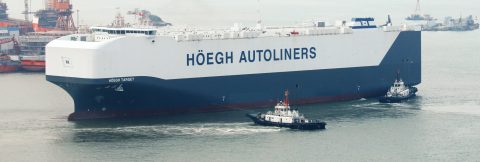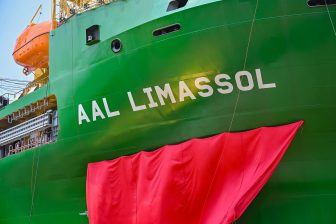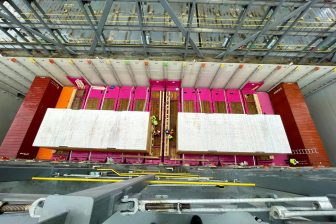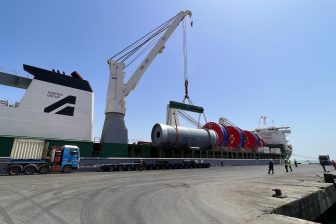
Höegh Autoliners CEO: “Why focus on using a product that will be banned?”
Höegh Autoliners CEO Ivar Myklebust joins the club of scrubber critics and says he “stands firm” on the decision not to implement scrubbers to comply with the IMO 2020 regulations, but to use low sulphur fuel oil instead. “We have ordered zero scrubbers and will order no more”, Myklebust says.
There are many reasons to why Höegh Autoliners has decided against scrubbers, according to the CEO.
“First of all, the reasoning behind the IMO 2020 regulation is to reduce emissions from the global trading fleet. I am not so sure scrubbers will support that mission”, Ivar says. “Surely, scrubbers will reduce emissions to air, but it appears as it will just move the emissions to the sea instead.”
He continues: “Implementing a scrubber can actually end up increasing the CO2 footprint of a vessel. The scrubber adds weight to the vessel and requires tens of thousands of tons of water to wash through the systems each day. This requires energy and energy comes from burning more fuel, in this case high sulphur fuel.”
Economics
But Höegh’s case against scrubbers is not just an ethical one. The economics of scrubbers are simply not in favour of car carriers, which have high and enclosed deck spaces.
“Structurally, Pure Car and Truck Carriers (PCTC) are not ideal for scrubbers. Fourteen decks high, it is challenging to put in a scrubber that should go from the engine room up through the whole vessel to the chimney,” Myklebust says.
“Structurally, Pure Car and Truck Carriers (PCTC) are not ideal for scrubbers.
And there is the ban on open-loop scrubber systems. Amongst others, Singapore, China and the port of Fujairah have explicitly banned the use of open systems in their ports and regional waters, while countries like Belgium ban the discharge of waste water as part of a general discharge ban.
“If this is a trend it is impossible to say, but it looks like more ports will follow”, Myklebust says, pointing out that it is suggested that SECA-zones will follow suit. “Considering that each of Höegh Autoliners’ vessels spend 60 to 70 days in ports annually, often in areas where scrubbers are banned, it makes little sense for us to invest in scrubbers.”
Although there are hybrid systems that allow ships to run both in open and closed loop to overcome these bans, these systems require additional tank storage for the scrubber’s waste water.
And last but not least, Myklebust begs the question: “Why focus on using a product that will be banned?”
Debate
In the past twelve months, there has been a fierce and public debate about the use of scrubbers, with advocates and critics seeking publicity through interviews and reports that, depending on who ordered the research, are either in favour or against the use of scrubbers.
Citing the same environmental concerns as Höegh Autoliners, the European Commission in February called upon the International Maritime Organization (IMO) to create uniform guidelines under which scrubbers are allowed to operate.
The sooner uniform and unambiguous regulatory measures are developed and adopted, the better.
“The potential toxicity of Exhaust Gas Cleaning Systems’ water discharges, due to the very nature of the pollutant substances present in the exhaust gases, and the increase in the number of these systems require careful consideration to avoid irreversible pollution of the marine environment,” the Commission wrote in a proposal.
It continued: “The sooner uniform and unambiguous regulatory measures are developed and adopted, the better the potential pollution will be controlled and the less significant the economic impacts will be both on industry and administrations. These measures are therefore considered urgent.”
The Clean Shipping Alliance 2020 (CSA 2020), a scrubber advocate group of 36 shipping companies including one of the largest multipurpose vessel operators Spliethoff, who recently secured secured 110 million euros in financing from ING and the European Investment Bank (EIB) to equip 42 of its vessels with scrubbers, expressed strong concerns about the EC’s proposal.
It appears the submission to IMO was prepared with speed rather than accuracy.
“This proposal is an attempt by the European Commission to push forward restrictions on scrubbers, which are accepted globally by the IMO, EU and others as acceptable means of improving air emissions quality in controlled areas,” said CSA 2020 Executive Director Ian Adams.
He lashed out saying: “I am sure Brussels is very aware that existing scientific data shows significant air emissions improvement from scrubbers, with no likely impact on the ocean environment, but it appears the submission to IMO was prepared with speed rather than accuracy.”
While discussions are still ongoing, CSA 2020 just this week welcomed the decision of the South African Maritime Safety Authority (SAMSA) to allow the use of all types (closed, hybrid and open) scrubbers in their waters and ports.
Extra costs
An important reason for shipowners to publicly join the debate is not just to influence policymakers, but also to justify the extra costs shipping companies will pass onto their customers.
With shipping rates already down at unsustainable levels in the RoRo industry, this is not a cost that can be carried by the shipping lines.
There are currently three ways of complying with the new sulphur guidelines. A shipping company can either switch to low sulphur fuel, install LNG engines that can run on natural gas or install scrubbers, which allows a shipping company to burn cheaper, high sulphur fuel. No matter how you do it, transporting cargo by sea will be more expensive from 1 January 2020. Those that invest in scrubbers will need their investments to be paid off and for those using Very Low Sulphur Fuel Oil or Low Sulphur Marine Gas Oil, the fuel will be considerably more expensive.
“With shipping rates already down at unsustainable levels in the RoRo industry, this is not a cost that can be carried by the shipping lines,” Myklebust says. “In our industry, the standard is to share the risk and return of bunker price shifts with the customers, through a Bunker Adjustment Factor in the contracts. Focus is now on assuring that all our contracts reflect the new standard bunker point, as we approach end of 2019.”
You just read one of our premium articles free of charge
Register now to keep reading premium articles.



